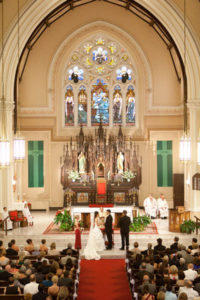
By Barb Arland-Fye
Bishop Martin Amos appreciates Pope Francis’ desire to seek input from people in the pews as well as bishops’ conferences for the 2014 Synod of Bishops on pastoral challenges facing families.
A survey with nine questions (each with a subset of questions) has been posted on the diocesan website (www.davenportdiocese.org) along with short documents explaining the purpose of the survey and reiterating Church teaching. Responses are due Dec. 1.
A questionnaire that the Bishops’ Conference of England and Wales posted online in late October served as a model for the diocesan survey, which is available in English and Spanish. Media reports on the Brits’ survey erroneously stated that Catholics are being polled about their opinions on marriage and family.
“It is not a poll; it’s a questionnaire or survey. The Vatican asked us to disseminate it the best way we could throughout the diocese and this seems to be the best way,” Bishop Amos told The Catholic Messenger.
He encourages people to read the Vatican summary posted on the diocesan website in order to understand the context of the survey’s questions, which are not easy. For starters: “Describe how the Catholic Church’s teachings on the value of the family contained in the Bible, Gaudium et Spes, Familiaris Consortio and other documents of the post-conciliar Magisterium is understood by people today? What formation is given to our people today in the Church’s teaching on family life?”
Bishop Amos hopes to receive responses from a broad range of people including clergy, parish staff, volunteers and parishioners. Last week he sought input from the Presbyteral Council and the Diocesan Pastoral Council (DPC).
Working briefly in small groups, DPC members responded to the questions and shared their thoughts with the larger group. In general, DPC members noted a lack of consistency from parish to parish for education on family life. They described a “me first” society and its negative ramifications for the Church. They expressed concern that natural law is lost or dismissed with regard to the sacrament of marriage.
The Church’s moral teaching is not accepted. About 80 percent of married couples practice birth control. The practice of natural family planning and welcoming children into the family requires a change of heart. Separated, divorced and remarried Catholics have few pastoral programs to meet their needs.
Some DPC members thought priests should take the first step in reaching out to people in these situations. Church and society need to distinguish between civil unions and the sacrament of marriage. Outreach is needed for individuals who are gay. It is estimated that gay couples make up 1 percent of the diocesan population while approximately 20 to 30 percent of households are led by single parents.
Witness talks by couples who have successfully completed the annulment process can be helpful. Stronger sacramental preparation would also be beneficial. Catholics must show the unconditional love of God and focus on the person, not on the action. People tend to forget that everyone is made in the image and likeness of God, DPC members said.
Bishop Amos invited DPC members to respond to the online survey; it is not necessary to answer questions a respondent isn’t comfortable answering. They could simply state “I don’t know.” Survey responses will be incorporated into the bishop’s report submitted Dec. 31 to the U.S. Conference of Catholic Bishops (USCCB), which will then be forwarded to the Vatican.
“The request from the Vatican is for the bishops throughout the world to have a synthesis of the responses collected,” Bishop Amos said. “It’s not just about the U.S.”
He hopes the Synod of Bishops meeting in October 2014 and a follow-up synod in 2015 will provide further insight about marriage and family issues that can be addressed at the diocesan level.
“We’ll continue to look at marriages here, but when a final report is issued by the pope it will give us direction as well,” Bishop Amos said.







